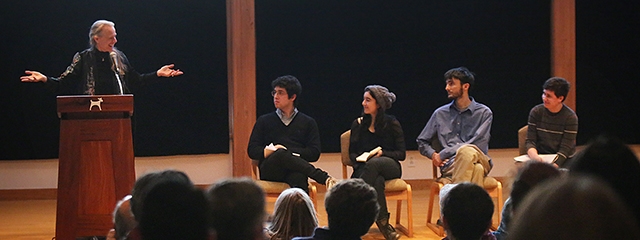Hampshire College offers a Concentration in Psychoanalytic Studies, a rare option at the undergraduate level.
All Hampshire students pursue personalized academic programs, driven by their own questions and interests. Professors across the College with related scholarly interests are able to provide in-depth support to those who want to explore psychoanalysis in relation to society and culture.
For undergraduates even to be able to minor in psychoanalytic studies is a rarity. For them to be able to shape an individualized course of study in psychoanalytic studies in a manner that parallels or exceeds what would be a major at a more traditional institution is an exceptional opportunity.
Hampshire recently celebrated the launch of its psychoanalytic studies concentration, with Marilyn Charles of the Austen Riggs Center as keynote speaker. Dr. Charles is president-elect of the Psychoanalytic Division of the American Psychological Association.
 In a lecture entitled “The Future of Psychoanalysis and the Next Generation,” Dr. Charles traced the history of prominent thinkers in analysis, her own path in choosing the field, and her delight at seeing such strong interest in the program at Hampshire.
In a lecture entitled “The Future of Psychoanalysis and the Next Generation,” Dr. Charles traced the history of prominent thinkers in analysis, her own path in choosing the field, and her delight at seeing such strong interest in the program at Hampshire.
She told students and young alums: “You are fortunate enough to have found your way to a program that offers you these resources as undergraduates.”
Hampshire professors involved in the program come from a variety of fields, including clinical psychology, literature, theatre, cultural studies, philosophy, and childhood studies. “People here seem to know how to facilitate creativity in those they work with,” Charles observed.
“Students seek psychoanalytic studies out because of the depth and breadth of the training it brings,” she said.
Charles also stressed the role of creativity and of mystery. Her own early work was in art and poetry, and she noted the need to respect the creative urge in all people.
“The psychoanalytic lens brings us into contact with the realm of mystery,” she said. “There is something about mystery that has always called to me. There’s room for mystery in psychoanalysis.”
The most prevalent application of psychoanalytic theory in the U.S. today is in the study of arts and literature, although some students pursuing the concentration at Hampshire are interested in clinical psychology and other clinical careers. Charles urged that all students learn the theory well enough to translate it into accessible language, as jargon can create distance from “the other” while plain language offers more constructive potential.
Through psychoanalytic studies, students can look intensively at current myth, eliminating cultural blind spots and trends. “The sky is the limit. There is so much we know that can be helpful to others,” she said.









I just discovered your program in Psychoanalytic Studies – this is wonderful in a world where universities are jettisoning psychoanalytic ideas and courses. As a psychoanalyst (University of Michigan and Michigan Psychoanalytic Institute) and former musician (Juilliard School), I have blended my careers and strongly believe in psychoanalytic ideas as worthwhile in their own right but also applicable outside the consulting room and concert hall – I write about this in my recent book “Melodies of the Mind”. I would like to be in touch with you about your courses and lectures. Congratulations on your creative and important contribution to our next generation of thinkers and doers. Julie Jaffee Nagel, Ph.D. (julienagel.net )
Dear Julie,
Thanks so much for your comments. Just so you know, a few of our studies have explored psychoanalysis in relation to music- as a practice and aesthetics. We will be envisioning further development of our program next year, and I will keep to the forefront this creative impulse to cross outside the conventional borders of psychoanalysis.
Annie Rogers
Professor of Psychoanalysis and Clinical Psychology